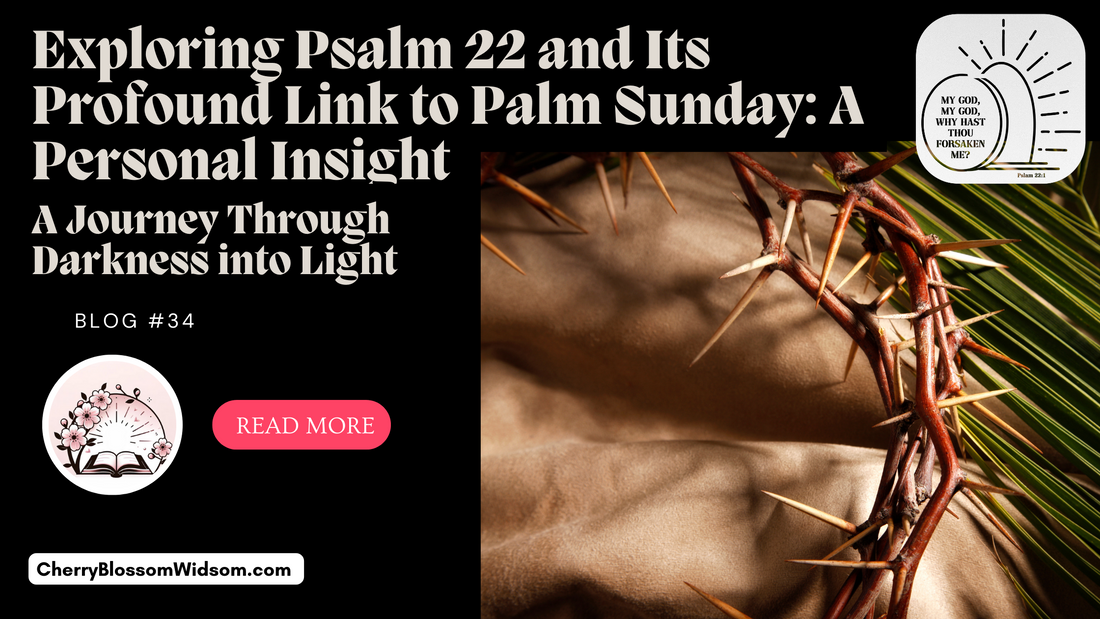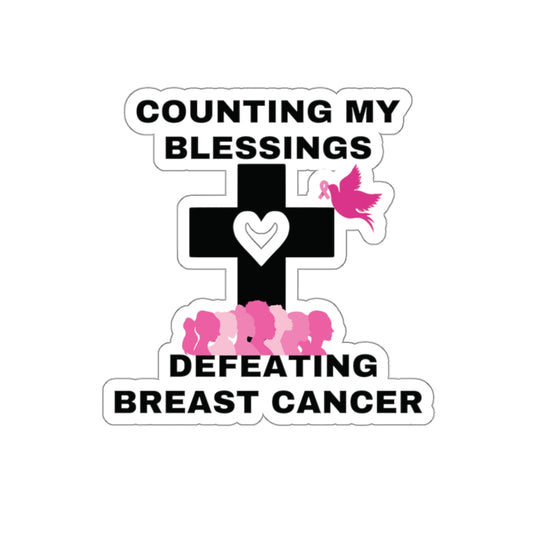A Journey Through Darkness into Light
Imagine standing in the midst of a crowd, voices echoing around you, a sense of anticipation in the air. But amidst this celebration, you feel an inexplicable pang of sorrow, a prelude to despair. This paradox of emotion is not just a figment of imagination but a profound experience that connects us to a moment in history and scripture—Palm Sunday and Psalm 22 (KJV). The journey from despair to hope in Psalm 22 mirrors the path Jesus Christ took from Palm Sunday through His crucifixion, offering believers deep insights into suffering, redemption, and the fulfillment of prophecies. Understanding these scriptures offers more than historical or religious insights; they provide comfort, guidance, and hope in our darkest hours, reminding us that despair can lead to redemption. While I share my interpretations and insights, it's from a place of reflection and study, aiming to engage in a meaningful conversation rather than assert expert authority. We'll explore each verse of Psalm 22, its themes of alienation and hope, and compare these with Palm Sunday's symbolism, enhancing our spiritual connection to these pivotal moments. Additionally, a section dedicated to journaling questions will encourage personal reflection on the themes discussed, inviting readers to explore their own spiritual journey from despair to hope.
Unveiling Psalm 22: A Verse-by-Verse Journey
Verse 1-2:
The Psalm opens with a powerful and poignant statement that captures the agony and faith of Jesus on the cross. The words "My God, my God, why hast thou forsaken me?" express a sense of abandonment and despair that is universal to human experience. Yet, despite this profound suffering, there is also a deep trust in God's presence that runs through Psalm 22. David's words remind us that feeling abandoned does not equate to being forgotten. Even in the darkest moments of our lives, God is still with us, even if we cannot feel his presence. This is a message of hope and comfort that has resonated with people of faith for thousands of years. The fact that these words were spoken by Jesus himself adds another layer of meaning to Psalm 22. It is a reminder that even the Son of God experienced the depths of human suffering and felt the sense of abandonment that comes with it. Yet, even in his darkest hour, Jesus held on to his faith in God and trusted in his presence. This is a powerful example for us to follow, no matter what challenges we may face in our own lives.


In the spirit of sharing forgiveness, I've created a beautiful piece of art, the Responsorial Psalm 22:1 Metal Wall Art available at MysticalCherry.com
If you're interested, check it out. Remember, purchasing through this link may support the blog at no additional cost to you.
Verse 3-5:
3 But thou art holy,
O thou that inhabitest the praises of Israel.
4 Our fathers trusted in thee:
They trusted, and thou didst deliver them.
5 They cried unto thee, and were delivered:
They trusted in thee, and were not confounded.
David contrasts their despair with the faithfulness of his ancestors, who trusted and were delivered. It's a call to remember past deliverances, to understand that our trials are not the end of our story.
Despite the apparent hopelessness and despondency of the situation, David takes comfort in the fact that his ancestors, who faced similar struggles and hardships, were delivered from their troubles through their trust in a higher power.
David thus urges us to remember the past deliverances of our forebears and to draw strength and inspiration from their stories. By doing so, we can understand that our present trials and tribulations are not the end of our story, but merely one chapter in a larger narrative. This perspective can help us to maintain hope and resilience in the face of adversity, and to navigate the challenges of life with a greater sense of purpose and meaning.
Verse 6-8:
6 But I am a worm, and no man;A reproach of men, and despised of the people.
7All they that see me laugh me to scorn:
They shoot out the lip, they shake the head, saying,
8He trusted on the LORD that he would deliver him:
Let him deliver him, seeing he delighted in him.
These verses serve as a powerful reminder of the Bible's prophetic nature, as they accurately predicted the events that would unfold during Jesus' trial and crucifixion.
Jesus faced immense humiliation and scorn during his trial, sentencing, and crucifixion. However, he endured these trials with steadfast faith and dedication to his mission. His unwavering faith and dedication to his mission were instrumental in fulfilling the prophecy in the Psalm, revealing the divine plan that was at work throughout his life and ministry.
Despite the challenges he faced, Jesus remained focused on his mission, which was to save humanity from sin. He inspired countless believers throughout history to follow his example and trust in God's plan for their lives. His sacrifice on the cross served as a powerful reminder of the love and compassion of God, as well as the lengths to which He was willing to go to save humanity.
These verses highlights the importance of faith and trust in God's plan for our lives. It also reminds us of the prophetic nature of the Bible and the power of its message to inspire and transform lives.
Verse 9-11:
9But thou art he that took me out of the womb:Thou didst make me hope when I was upon my mother's breasts.
10I was cast upon thee from the womb:
Thou art my God from my mother's belly.
11Be not far from me; for trouble is near;
For there is none to help.
In this passage, David reflects on the idea that he and all of us have been under God's care since birth. He emphasizes the concept of providence, which refers to God's constant watchful presence over us. Even when we are not aware of it, God is always present in our lives, guiding and leading us through life's journeys.
These verses express a deep sense of humiliation and scorn, which Jesus also experienced during His trial and crucifixion. By enduring these hardships, Jesus fulfilled the prophecy and highlighted the prophetic nature of the Psalm.
David's words serve as a powerful reminder that we are never alone. Even in our darkest moments, God is present to provide guidance and protection. This idea can bring us comfort and hope, knowing that we can always turn to God for help and guidance in our lives.
Verses 12-18
12 Many bulls have compassed me:Strong bulls of Bashan have beset me round.
13They gaped upon me with their mouths,
As a ravening and a roaring lion.
14I am poured out like water, and all my bones are out of joint:
My heart is like wax; It is melted in the midst of my bowels.
15My strength is dried up like a potsherd; And my tongue cleaveth to my jaws;
And thou hast brought me into the dust of death.
16For dogs have compassed me:
The assembly of the wicked have inclosed me:
They pierced my hands and my feet.
17I may tell all my bones:
They look and stare upon me.
18They part my garments among them,
And cast lots upon my vesture.
In Psalm, David's depiction of suffering and the casting of lots for his garments is a powerful prophecy of the crucifixion scene and messianic prophecies. It is a depiction of the suffering and persecution that he and his people faced. In verses 12-18, David paints a vivid and graphic picture of their pain and torment. He describes how their enemies cast lots for their garments while they cry out to God for help. This passage is a poignant reminder of the unjust and cruel treatment that the innocent often experience.
What makes this passage even more striking is the similarity between this scene and the crucifixion of Jesus Christ centuries later. The imagery of casting lots for garments is echoed in the Gospel accounts of the crucifixion. It becomes clear that this Psalm is not only a personal lament but also a prophetic glimpse into the coming of the Messiah.
The Psalm brings to light the messianic prophecies and provides an insight into the nature of the Messiah. The suffering, pain, and persecution that David and his people faced prefigure the suffering that Jesus Christ would endure. The casting of lots for garments is a reminder of the humiliation and indignity that Jesus would face.
Overall, this Psalm is a powerful reminder of the suffering that the innocent endure and a prophecy of the coming of the Messiah. It is a testament to the enduring power of the Scriptures and the prophetic insight they provide.
Verses 19-21
19 But be not thou far from me, O LORD:
O my strength, haste thee to help me.
20Deliver my soul from the sword;
My darling from the power of the dog.
21Save me from the lion's mouth:
For thou hast heard me from the horns of the unicorns.
The plea for deliverance that David makes in this passage is a deeply emotional and powerful one. It speaks to the human experience of feeling trapped, helpless, and overwhelmed by adversity. David's plea is a reminder that even when we find ourselves in the depths of despair, there is always hope for salvation.
David's cry for deliverance is a call to trust in God's power and protection, even when we are facing seemingly insurmountable challenges. It is a reminder that we are not alone in our struggles, and that God is always there for us, ready to come to our aid when we call upon Him.
Through his plea for deliverance, David shows us that it is possible to find hope, even in the darkest of times. He reminds us that no matter how dire our circumstances may seem, we can always turn to God for strength, comfort, and guidance. And he inspires us to have faith that, with God's help, we can overcome any obstacle, no matter how great.
Verses 22-31
22I will declare thy name unto my brethren:In the midst of the congregation will I praise thee.
23Ye that fear the LORD, praise him;
All ye the seed of Jacob, glorify him; And fear him, all ye the seed of Israel.
24For he hath not despised nor abhorred the affliction of the afflicted;
Neither hath he hid his face from him; But when he cried unto him, he heard.
25My praise shall be of thee in the great congregation:
I will pay my vows before them that fear him.
26The meek shall eat and be satisfied:
They shall praise the LORD that seek him: Your heart shall live for ever.
27All the ends of the world shall remember and turn unto the LORD:
And all the kindreds of the nations shall worship before thee.
28For the kingdom is the LORD's:
And he is the governor among the nations.
29All they that be fat upon earth shall eat and worship:
All they that go down to the dust shall bow before him:
And none can keep alive his own soul.
30A seed shall serve him;
It shall be accounted to the LORD for a generation.
31They shall come, and shall declare his righteousness
Unto a people that shall be born, that he hath done this.
The Psalm that is being referred here is Psalm 22, which is a psalm of lamentation and hope. It begins with David's cry of anguish, feeling abandoned by God and surrounded by enemies. However, the Psalm ends on a triumphant note, declaring that God has not forsaken His people and that He will deliver them from their afflictions.
David proclaims that their suffering has led to deliverance, as God has heard their cries and answered their prayers. He praises God for His faithfulness and mercy, acknowledging that it is only through God's grace that they have been saved. Furthermore, he promises to remember and recount God's deeds to future generations so that they, too, may be encouraged and strengthened in their faith.
This promise of remembrance is not only a testament to God's faithfulness, but it is also reminiscent of the legacy of Palm Sunday and Holy Week. The triumphal entry of Jesus into Jerusalem on Palm Sunday, followed by His suffering, death, and resurrection during the Holy Week, is a powerful reminder of God's love and mercy towards humanity. This legacy has been celebrated and remembered by generations of believers, as they have been inspired by the victory of Christ over sin and death.
This Psalm concludes with a message of hope and deliverance, assuring that suffering will not last forever and that God will deliver His people. This message of hope is not only relevant to the people of that time, but it is also applicable to us today. We too can take comfort in the fact that God is faithful and merciful, and that He will deliver us from our afflictions.
The Road to Jerusalem: Palm Sunday and Beyond
Palm Sunday marks a juxtaposition of celebration and impending sorrow. As Jesus entered Jerusalem to hosannas, He moved closer to fulfilling the profound destiny prophesied in Psalm 22. This day, symbolizing both adoration and the onset of suffering invites us to reflect on the nature of our own celebrations and sorrows.
Reflective Questions for Journaling
- Have you ever felt forsaken or alone, as the Psalmist did? How did you find hope or solace during those times?
- Reflect on a moment of triumph after a period of suffering in your life. How does this parallel the transition from despair to praise in Psalm 22?
- How do you see the themes of Palm Sunday—celebration, sacrifice, and redemption—playing out in your own spiritual journey?
Final Thoughts: Finding Light in the Shadows
As we conclude this journey through Psalm 22 and its connection to Palm Sunday, we're reminded of the intricate tapestry of human emotion and divine promise woven through these texts. They teach us that despair can lead to hope, suffering can precede redemption, and through it all, we are never truly forsaken. May this exploration inspire you to delve deeper into your spiritual journey, find connections in these sacred texts, and discover the light in your own shadows.
Disclaimer: This reflection and analysis are my personal interpretations, shared in the spirit of fellowship and growth. They are not meant as expert theological advice but as a companion on your spiritual journey.
As we move from Palm Sunday into the contemplation of Holy Week, let's carry with us the lessons of Psalm 22—remembering that even in our darkest moments, redemption is on the horizon, and we are indeed never alone.






















